Sonnet 29(content 2)
Sonnet 29

with distinct features(容貌)
having friends
Shakespeare’s Sonnet 29
skill Desiring this man’s art and that man’s scope,
想有这人的权威,那人的才华,
wide range of knowledge With what I most enjoy contented least; Least contented with what I most enjoy satisfied
And look upon myself, and curse my fate,
又看看自己,只痛恨时运不济,
Shakespeare’s Sonnet 29
like someone Wishing me like to one more rich in hope,
愿自己像人家那样:或前程远大,
Featured like him, like him with friends possess’d,
Shakespeare’s Sonnet 29
When, in disgrace with fortune and men’s eyes,
我一旦失去了幸福,又遭人白眼,
out of favor with I all alone beweep my outcast state,
就独自哭泣,怨人家把我抛弃,
Sonnet 29
by W. Shakespeare The rhyme scheme is abab,cdcd,efef,gg.
Listen
• When in dis grace with fortune and men's eyes, • I all alone beweep my outcast state, • And trouble deaf Heaven with my bootless cries, • And look upon myself, and curse my fate, • • Wishing me like to one more rich in hope, • Featur'd like him, like him with friends possess'd • Desiring this man's art, and that man's scope, • With what I most enjoy contented least: • • Yet in these thoughts myself almost despising, • Haply I think on thee,--and then my state • (Like to the lark at break of day arising • From sullen earth) sings hymns at heaven's gate; • • For thy sweet love remember'd such wealth brings • That then I scorn to change my state with kings'.教我不屑Fra bibliotek处境跟帝王对调。
sonnet 29
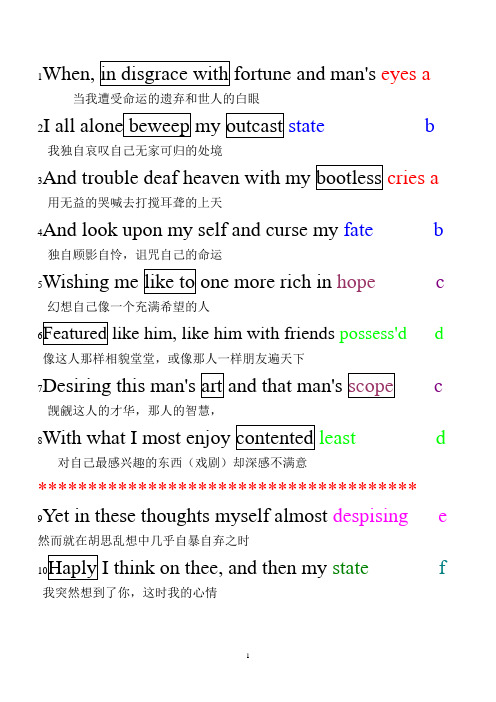
1When,eyes a 当我遭受命运的遗弃和世人的白眼
2state b 我独自哀叹自己无家可归的处境
3cries a 用无益的哭喊去打搅耳聋的上天
4And look upon my self and curse my fate b 独自顾影自怜,诅咒自己的命运
5hope c 幻想自己像一个充满希望的人
possess'd d 像这人那样相貌堂堂,或像那人一样朋友遍天下
7c 觊觎这人的才华,那人的智慧,
8least d 对自己最感兴趣的东西(戏剧)却深感不满意
**************************************
9Yet in these thoughts myself almost despising e 然而就在胡思乱想中几乎自暴自弃之时
state f 我突然想到了你,这时我的心情
11arising e 犹如天刚破晓时云雀展翅
12gate f 从郁闷的大地高唱圣歌飞向天门
13For thy sweet love remember'd such wealth brings g 因为回忆你甜蜜的友情给我带来巨大的财富
14kings g 以至我不屑于跟帝王交换地位。
sonnet 29 笔记详解

流 e⒐ 鳓 r滩 鲳 鲫 蛐 埘
Sonnet 29
′
Ia丨 :1
And bokupⅢ e cu阝 扌
导 :岁 gs: 唯有独自把飘零 笱笆C我
;亻 广
我
跏
然 掣
掣
霪
呈 里 世悲叹。 犟 自身 勺
莒
ˉ Ⅶ 咒 目 酬 跚 胚
但 愿
myfa△ …
是珍宝 ` 因想到你甜蜜的爰价值干金 ` 我记着你的甜爱 `就 王对调。 我不屑与帝王交换我的处境 。 教我不屑把处境跟帝
申 辜△±译 T鼋 , -
但记住你柔情招 来财无限 ` 与换江 山。 纵帝王屈尊就我 `不
o f 臼‘ 潴e
hl= l龟
佻
明伦教授译本 [附2]:曹 岸译本 附 【 3]:屠 ˉ
宗岱教授译本 [附11:梁
一 遭人自眼 J 遭世人白眼 f 我 旦失去了幸福 `又 逢时运不济 `又 人家杷我抛弃 ` 我独自向隅而泣恨无枝可依 ` 就独自哭泣 f怨 J冷 苍天 f 忽而枉对聋聩苍昊祈哀告 ` 白自地用哭喊来麻烦聋耳的 徒用呼吁去干扰聋 溃的吴天 ` 痛恨时运不济 ` 又看看 自己 `只 咒自己的生辰 ` 忽而反躬 自省咒诅命运乖戾 ` 顾盼着身影 `诅 当我受尽命运和人们的自眼 f 暗暗地裒淖自己的身世飘零 J 前程远大 ` 一 一 总指望自己像人家前程似锦 J 愿自己像人家那样 :或 愿我和另 个 样富于希望 j 一 胜友如云广交谊 ` 一 斯宾朋满座 J 或 表人才 `或 和他 样广交游 ` 梦此君美貌 `慕 面貌相似 I又 人的才华 ` 夫机遇缘分 ` 想有这人的权威 `那 叹彼君艺高 `馋 人的内行 J 希求这人的渊博 `那 最不满意 : 于自己平素最得意的 `倒 却偏偏看轻自家的至福极乐 最赏心的乐事觉得最不对头 : J 但在这几乎是看轻自己的思想里 ` 我 可是 `当 正要这样看轻自己 ` 可正当我妄自菲薄自惭形秽 的心怀 我偶尔想到了你呵 `-我 是我心 是我的精神 ` 我忽然想到了你 `于 忽然想起了你 `于 云雀从阴郁的大地 便像云雀在黎明时振翮高飞 ` 顿时像破晓的 便像云雀破晓从阴霾的大地 唱起赞美诗来 : 冲上了天门 `歌 唱着圣歌在天门 : 离开阴沉的大地歌唱在天门 i 振翮上升 `高 一想起你 的爱使我那么富有 J 和帝王换位我也不屑于屈就。
十四行诗29逐句解析
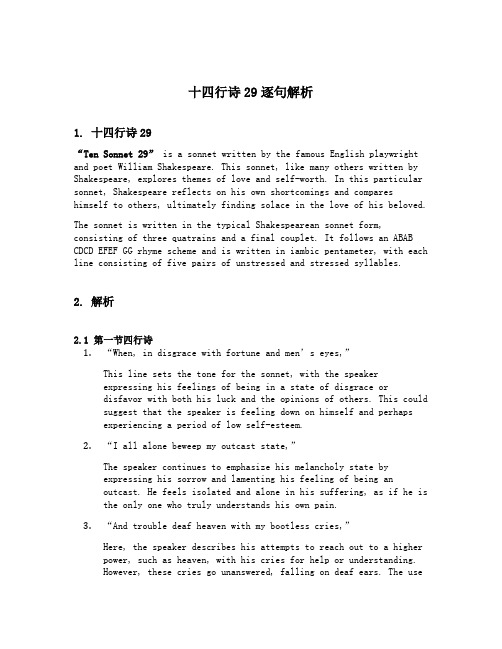
十四行诗29逐句解析1. 十四行诗29“Ten Sonnet 29” is a sonnet written by the famous English playwright and poet William Shakespeare. This sonnet, like many others written by Shakespeare, explores themes of love and self-worth. In this particular sonnet, Shakespeare reflects on his own shortcomings and compares himself to others, ultimately finding solace in the love of his beloved.The sonnet is written in the typical Shakespearean sonnet form, consisting of three quatrains and a final couplet. It follows an ABAB CDCD EFEF GG rhyme scheme and is written in iambic pentameter, with each line consisting of five pairs of unstressed and stressed syllables.2. 解析2.1 第一节四行诗1.“When, in disgrace with fortune and men’s eyes,”This line sets the tone for the sonnet, with the speakerexpressing his feelings of being in a state of disgrace ordisfavor with both his luck and the opinions of others. This could suggest that the speaker is feeling down on himself and perhapsexperiencing a period of low self-esteem.2.“I all alone beweep my outcast state,”The speaker continues to emphasize his melancholy state byexpressing his sorrow and lamenting his feeling of being anoutcast. He feels isolated and alone in his suffering, as if he is the only one who truly understands his own pain.3.“And trouble deaf heaven with my bootless cries,”Here, the speaker describes his attempts to reach out to a higher power, such as heaven, with his cries for help or understanding.However, these cries go unanswered, falling on deaf ears. The useof the word “bootless” implies that his pleas are futile andwithout any meaningful effect.4.“And look upon myself, and curse my fate,”The speaker turns inward, reflecting on himself and hiscircumstances. He expresses a sense of frustration and angertowards his own fate, as if he blames himself for his misfortunes.This self-cursing might indicate a lack of self-acceptance orself-compassion.2.2 第二节四行诗1.“Wishing me like to one more rich in hope,”The speaker begins to compare himself to someone who is morefortunate, particularly in terms of their outlook on life. Thisperson is described as being “rich in hope,” suggesting thatthey possess a sense of optimism and possibility that the speaker lacks.2.“Featured like him, like him with friends possessed,”The speaker continues the comparison, noting that this person isnot only hopeful but also has desirable physical features and astrong social network. The word “featured” impliesattractiveness or good looks, while “possessed” suggests a sense of belonging and companionship.3.“Desiring this man’s art and that man’s scope,”The speaker expresses a desire for the talents and abilities ofothers. He longs to possess the same skills and opportunities that others enjoy, suggesting a sense of envy or inadequacy. This line reflects a common human tendency to compare oneself to others and feel lacking.4.“With what I most enjoy contented least;”The speaker contrasts his own situation with that of the person he has been admiring. While others seem content with what brings them joy, the speaker feels the least content with what brings himhappiness. This line highlights the speaker’s dissatisfactionwith his own life and circumstances.2.3 第三节四行诗1.“Yet in these thoughts myself almost despising,”The speaker acknowledges his own self-despising thoughts,recognizing that he is allowing negative self-perception tocontrol his mindset. Despite the realization, he still strugglesto break free from these thoughts and feelings of inadequacy.2.“Haply I think on thee, and then my state,”The speaker experiences a shift in his thinking when he recallshis beloved. The word “haply” suggests that this happens bychance or accident. When he focuses on his beloved, his state ofmind and emotions begin to change.3.“Like to the lark at break of day arising,”The speaker uses a simile to compare his state of mind to that ofa lark rising at dawn. Just as the lark’s song heralds thebeginning of a new day, the speaker’s thoughts of his belovedbring about a renewed sense of hope and optimism.4.“From sullen earth, sings hymns at heaven’s gate;”The lark is further described as singing joyful hymns as itascends towards the gates of heaven. This imagery suggests a sense of transcendence and a lifting of the speaker’s spir its. Thereference to heaven once again suggests a higher power or a sense of the divine.2.4 结尾两行诗1.“For thy sweet love remembered such wealth brings”The speaker concludes the sonnet by attributing the newfoundwealth and contentment in his life to the me mory of his beloved’s sweet love. The remembrance of their love brings him a sense ofrichness and abundance, counteracting the feelings of disgrace and discontent expressed earlier in the sonnet.2.“That then I scorn to change my state with kings.”In the final couplet, the speaker asserts that he feels no desire to exchange his current state with that of kings, implying thatthe love he experiences is far more valuable and fulfilling thanany material wealth or power. This line serves as a finalaffirmation of the transformative power of love and its ability to bring a sense of worth and contentment.3. 总结Shakespeare’s “Sonnet 29” is a reflection on the speaker’s feelings of disgrace and discontent, followed by a shift in perspective brought about by the me mory of his beloved’s love. It explores themes of self-worth, envy, and the transformative power of love. The sonnet’s structure, language, and imagery contribute to conveying the speaker’s emotional journey from despair to hope, ultimately finding solace in the love of his beloved.。
《行路难》和《Sonnet29》语言差异对比
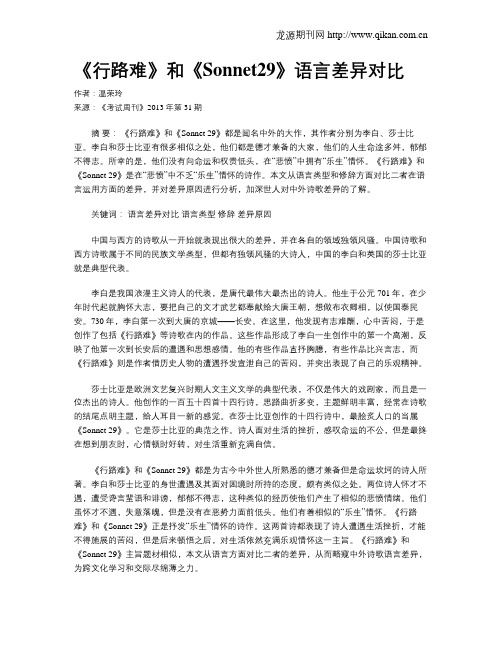
《行路难》和《Sonnet29》语言差异对比作者:温荣玲来源:《考试周刊》2013年第31期摘要:《行路难》和《Sonnet 29》都是闻名中外的大作,其作者分别为李白、莎士比亚。
李白和莎士比亚有很多相似之处,他们都是德才兼备的大家,他们的人生命途多舛,郁郁不得志。
所幸的是,他们没有向命运和权贵低头,在“悲愤”中拥有“乐生”情怀。
《行路难》和《Sonnet 29》是在“悲愤”中不乏“乐生”情怀的诗作。
本文从语言类型和修辞方面对比二者在语言运用方面的差异,并对差异原因进行分析,加深世人对中外诗歌差异的了解。
关键词:语言差异对比语言类型修辞差异原因中国与西方的诗歌从一开始就表现出很大的差异,并在各自的领域独领风骚。
中国诗歌和西方诗歌属于不同的民族文学类型,但都有独领风骚的大诗人,中国的李白和英国的莎士比亚就是典型代表。
李白是我国浪漫主义诗人的代表,是唐代最伟大最杰出的诗人。
他生于公元701年,在少年时代起就胸怀大志,要把自己的文才武艺都奉献给大唐王朝,想做布衣卿相,以使国泰民安。
730年,李白第一次到大唐的京城——长安。
在这里,他发现有志难酬,心中苦闷,于是创作了包括《行路难》等诗歌在内的作品。
这些作品形成了李白一生创作中的第一个高潮,反映了他第一次到长安后的遭遇和思想感情。
他的有些作品直抒胸臆,有些作品比兴言志,而《行路难》则是作者借历史人物的遭遇抒发宣泄自己的苦闷,并突出表现了自己的乐观精神。
莎士比亚是欧洲文艺复兴时期人文主义文学的典型代表,不仅是伟大的戏剧家,而且是一位杰出的诗人。
他创作的一百五十四首十四行诗,思路曲折多变,主题鲜明丰富,经常在诗歌的结尾点明主题,给人耳目一新的感觉。
在莎士比亚创作的十四行诗中,最脍炙人口的当属《Sonnet 29》。
它是莎士比亚的典范之作。
诗人面对生活的挫折,感叹命运的不公,但是最终在想到朋友时,心情顿时好转,对生活重新充满自信。
《行路难》和《Sonnet 29》都是为古今中外世人所熟悉的德才兼备但是命运坎坷的诗人所著。
双语阅读:莎翁十四行诗第29首

双语阅读:莎翁十四行诗第29首莎翁的十四行诗历来被人们所推崇,下面,店铺为大家送上莎翁十四行诗第29首,希望大家喜欢。
SONNET 29 十四行诗第29首 [英] 莎士比亚When in disgrace with fortune and men's eyes 遭人白眼,命运把我羞辱-I all alone beweep my outcast state,只身向隅,为被弃而哀哭,And trouble deaf heaven with my bootless cries, 冲聩聩苍天,我徒然惨呼,And look upon myself, and curse my fate,反躬自顾,我将厄运咒诅。
Wishing me like to one more rich in hope, 但愿我如某君前程煌煌,Featur'd like him, like him with friends possess'd, 喜其交际宽广,容颜厮像;Desiring this man's art, and that man's scope, 机巧者、通达者,我都向往,With what I most enjoy contented least;-最为欣赏的,希望最渺茫;Yet in these thoughts myself almost despising, 但这么想,几将自身看轻,Haply I think on thee,—and then my state, 我陡然想到你,宛若百灵-Like to the lark at break of day arising 从晦暗的大地冲破黎明,From sullen earth, sings hymns at heaven's gate; 高唱着圣歌在天府门庭。
For thy sweet love remember'd such wealth brings念及你的柔情富可敌国-That then I scorn to change my state with kings.那君王之位算得了什么!-by William Shakespeare(1564 -1616) [附1]:梁宗岱教授译本-当我受尽命运和人们的白眼,暗暗地哀悼自己的身世飘零,徒用呼吁去干扰聋瞆的昊天,顾盼着身影,诅咒自己的生辰,愿我和另一个一样富于希望,面貌相似,又和他一样广交游,希求这人的渊博,那人的内行,最赏心的乐事觉得最不对头;可是,当我正要这样看轻自己,忽然想起了你,于是我的精神,便像云雀破晓从阴霾的大地振翮上升,高唱着圣歌在天门:一想起你的爱使我那么富有,和帝王换位我也不屑于屈就。
莎士比亚29首诗鉴赏
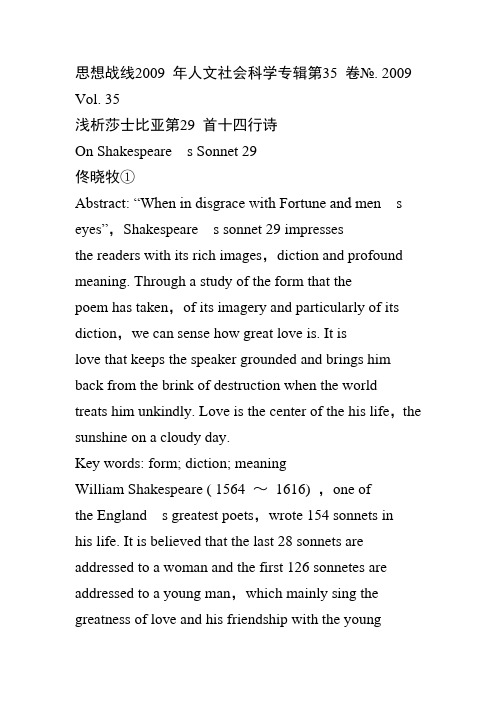
思想战线2009 年人文社会科学专辑第35 卷№. 2009 Vol. 35浅析莎士比亚第29 首十四行诗On Shakespeare s Sonnet 29佟晓牧①Abstract: “When in disgrace with Fortune and men s eyes”,Shakespeare s sonnet 29 impressesthe readers with its rich images,diction and profound meaning. Through a study of the form that thepoem has taken,of its imagery and particularly of its diction,we can sense how great love is. It islove that keeps the speaker grounded and brings him back from the brink of destruction when the world treats him unkindly. Love is the center of the his life,the sunshine on a cloudy day.Key words: form; diction; meaningWilliam Shakespeare ( 1564 ~1616) ,one ofthe England s greatest poets,wrote 154 sonnets inhis life. It is believed that the last 28 sonnets are addressed to a woman and the first 126 sonnetes are addressed to a young man,which mainly sing the greatness of love and his friendship with the youngman. Sonnet 29 is one of them. This sonnet impresses me most with its rich images,diction and profound meaning. Through a study of the form that thepoem has taken,of its imagery and particularly of its diction,we can sense how great the love is. It islove that keeps the speaker grounded and brings him back from the brink of destruction when the world treats him unkindly. Love is the center of the hislife,the sunshine on a cloudy day.Stylistically,it is a typically Shakespearian inits form. It is written in iambic pentameter,usingthe rhyme scheme a b a b,c d c d,e f e f in thefirst twelve lines and then concludes it with a rhyming couplet g g. For this sonnet,the first eightlines,which begins with“when”,establish a conditional argument and show the poet s frustration withhis craft. The third quatrain,beginning with“yet”similar to other sonnets “But”,and resolving the conditional argument,presents a splendid image of a morning lark that“sings hymns at heaven s gate. ”This image epitomizes the poet s delightful memoryof his friendship with the youth and compensates forthe misfortune he has lamented. And then,the ending couplet sums up the meaning of the sonnet. Thisis the convention of logical and rhetorical organization that governs Shakespearian sonnets,namely“a structure of two parts laid over four. The two partsare the three quatrains,on the one hand,and the concluding or revolving couplet,on the other. ”Soin most Shakespearian sonnets,“The turn normally occurs at the beginning of line 13. Each of the quatrains should serve in its own way to complicate the situation or to advance the dilemma which is the couplet s b usiness to resolve. ”It is through the choice of the structure that the poet hints that themost important part of the sonnet is not in his depression and anxiety presented in the quatrains. Instead,it lies in the final independently rhymed couplet,the last two lines which help bring about theturn and also the climax of the poem.While moving from quatrain to quatrain,wemay be also impressed by its rich imagery. The image brought about in lines 9 ~12 are critical pointsin the sonnet as it changes the focus of the sonnet.The first portion of the sonnet focuses on a great dealof challenge and misfortune. Yet,through the invocation of the love subject of the speaker,we begin tosee how the power and redemptive spirit of love canbe transformative. The simile which helps to evokethis would be the use of the bird. When Shakepeare ·37·①作者简介: 佟晓牧,云南大学大学外语教学部讲师( 云南昆明,650091) 。
(完整word版)莎士比亚_sonnet_29的中文翻译及评析
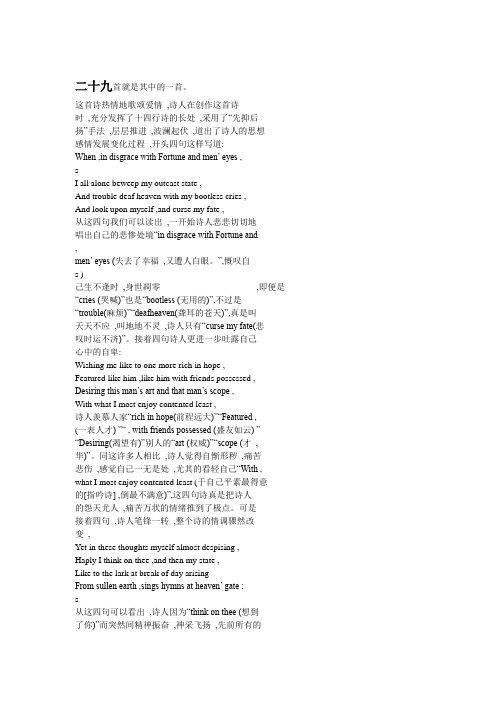
二十九首就是其中的一首。
这首诗热情地歌颂爱情,诗人在创作这首诗时,充分发挥了十四行诗的长处,采用了“先抑后扬”手法,层层推进,波澜起伏,道出了诗人的思想感情发展变化过程,开头四句这样写道:When ,in disgrace with Fortune and men’ eyes ,sI all alone beweep my outcast state ,And trouble deaf heaven with my bootless cries ,And look upon myself ,and curse my fate ,从这四句我们可以读出,一开始诗人悲悲切切地唱出自己的悲惨处境“in disgrace with Fortune and,men’ eyes (失去了幸福,又遭人白眼。
”,慨叹自s )己生不逢时,身世凋零,即便是“cries (哭喊)”也是“bootless (无用的)”,不过是“trouble(麻烦)”“deafheaven(聋耳的苍天)”,真是叫天天不应,叫地地不灵,诗人只有“curse my fate(悲叹时运不济)”。
接着四句诗人更进一步吐露自己心中的自卑:Wishing me like to one more rich in hope ,Featured like him ,like him with friends possessed , Desiring this man’s art and that man’s scope ,With what I most enjoy contented least ,诗人羡慕人家“rich in hope(前程远大)”“Featured ,(一表人才) ”“ , with friends possessed (盛友如云) ” “Desiring(渴望有)”别人的“art (权威)”“scope (才, 华)”。
同这许多人相比,诗人觉得自惭形秽,痛苦悲伤,感觉自己一无是处,尤其的看轻自己“With , what I most enjoy contented least (于自己平素最得意的[指吟诗] ,倒最不满意)”,这四句诗真是把诗人的怨天尤人,痛苦万状的情绪推到了极点。
- 1、下载文档前请自行甄别文档内容的完整性,平台不提供额外的编辑、内容补充、找答案等附加服务。
- 2、"仅部分预览"的文档,不可在线预览部分如存在完整性等问题,可反馈申请退款(可完整预览的文档不适用该条件!)。
- 3、如文档侵犯您的权益,请联系客服反馈,我们会尽快为您处理(人工客服工作时间:9:00-18:30)。
(I wish I) looked like a handsome man or like a man who has many friends. So I envy this guy’s talent or that guy’s intelligence, I am not satisfied with drama which I liked best.
5 Wishing me like to one more rich in hope, like 6 Featur'd like him, like him with friends possess'd,
7 Desiring this man’s art and that man’s scope intelligence , 8 With what I most enjoy Drama contented least ,
When I remember our frie I would rather be your friend than becoming a king.
The word “state” is used 3 times to mean “condition” (2) 处境, “mood” (10) 心情 and “social status” (14)社会地位 respectively.
Sonnet 29
• By William Shakespeare
11120
张婧
You are the morning lark
1 When,in disgrace with fortune and men's eyes, 2 I all alone beweep my outcast state 3 And trouble deaf heaven with my bootless cries 4 And look upon myself and curse my fate, 5 Wishing me like to one more rich in hope, 6 Featur'd like him, like him with friends possess'd, 7 Desiring this man's art and that man's scope, 8 With what I most enjoy contented least; 9 Yet in these thoughts myself almost despising, 10 Haply I think on thee, and then my state, 11 Like to the lark at break of day arising 12 From sullen earth, sings hymns at heaven's gate; 13 For thy sweet love remember'd such wealth brings 14 That then I scorn to change my state with kings.
status处境
•
3 And trouble deaf heaven with my bootless cries (useless) • 4 And look upon my self and curse my fate (顾影自怜) • When fortune deserts me and people around despise me, I’m sad and weep because I have no home nor friends,and I cry to heaven who can’t hear, so I look at myself and complain against Fate.
The three words “fortune” (1), “heaven” (2) and “fate”(4) all refer to the supernatural power that determines men’s destiny
Theme
“sweet love" means great friendship and steadfast love, which can supply you with tremendous encouragement when you are in trouble.
“That then I scorn to change my state with kings”
你是报晓的云雀
• • • • • • • • • • • • • • 我时运不济,遭人白眼,一生无颜, 孤独愁苦中哀叹着自己飘零的今天, 悲哀呼号无济于事,感动不了上天, 到头来只能作践自己诅咒命运多艰: 有时候我唯愿自己与他人一样富有, 像他那样眉清目秀,满座亲朋好友, 有时羡慕这人的本事,那人的才华, 最值得珍惜的事反倒觉得最不满足。 可是,就在这些自暴自弃的念头中, 我忽然想到了你,于是乎我的心境 就像报晓的云雀从昏暗的大地跃起, 高声唱出赞美圣歌婉转在天堂之门。 想起你甜美的爱带给我无穷的财富, 即使改变处境当个国王我也会说不。
Part 1(lines 1-8) describes the poet’s desperate condition
被……所鄙夷 • 1 When, in disgrace with fortune and men's eyes 无亲无友的 • 2 I all alone beweep my outcast state 为……而哭泣
Couplet
• 13 For thy sweet love remember'd such wealth brings ①friendship status 地位 ②homosexual love 不屑于 • 14 That then I scorn to change my state with kings.
think of
天刚破晓
11 Like to the lark at break of day arising
12 From sullen earth, sings hymns at heaven's gate; unpleasant
(my mood is) like the skylark who in the early morning flies up from the sad earth and soars to the Gate of Heaven where he sings happy songs.
Part 2 (lines 9-14): The poet gets mental comfort from his friendship
9 Yet in these thoughts myself almost despising 自惭形秽 yo suddenly u • 10 Haply I think on thee, and then my state mood心情
